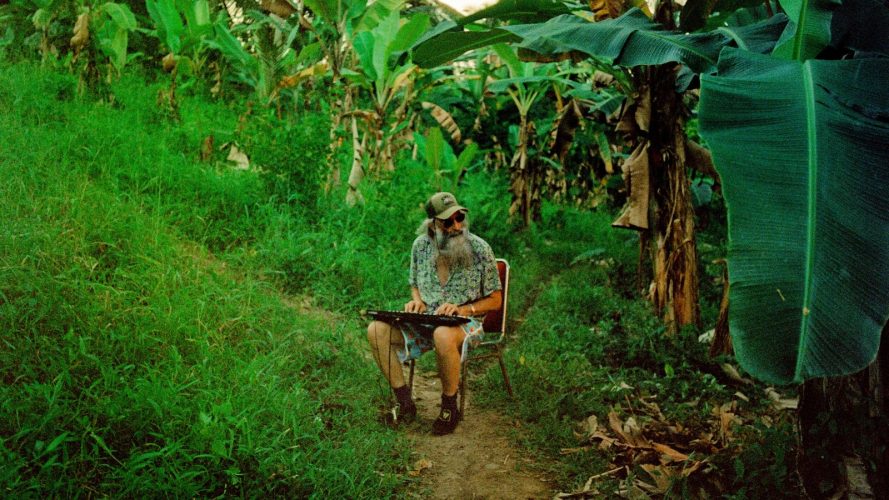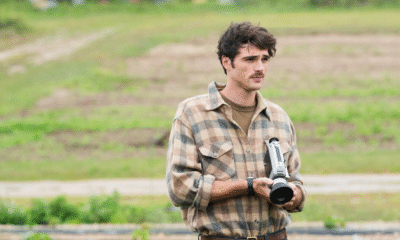

Featured Review
Ellis Park ★★★
Released: 26th September 2025
Directed: Justin Kurzel
If you’ve listened to Nick Cave and the Bad Seeds, you’ll know what an integral part of the band Warren Ellis is. From his hauntingly beautiful high-note singing to his immense skill as a multi-instrumentalist, Ellis’ fingerprints are all over the band’s music, even more so in their more recent work. Justin Kurzel’s (The Order) documentary, Ellis Park, touches on these musical achievements whilst delving into the personal life of Ellis, but as the title suggests, it also spotlights a wildlife sanctuary in Sumatra that Ellis funds. The resulting film is an admirable but disjointed effort. Despite capturing Ellis’ obvious affection and empathy for the park’s animals and those who work there, Ellis Park feels disconnected; one part nature doc, one part music doc, both of which never easily coalesce.
This isn’t helped by the documentary’s lengthy first half spending time solely with Ellis, and barely referencing the wildlife sanctuary. Indeed, at the end of this part, an off-camera Kurzel quips that he “keeps forgetting we’re going to the park”, a view that will be echoed by more than a few viewers at this point. Nevertheless, on their own, these parts are engaging. Ellis Park gives us an eye-opening look into Ellis’ childhood and personality. We meet his elderly parents and witness who he got his incredible musical talent from, as well as his warm, charismatic, and witty personality. As the spearhead of their world-famous band, Nick Cave has often received the spotlight and plaudits more than Warren Ellis has, so this documentary feels refreshing in its point-of-view here.

Ellis Park then shifts to Sumatra, and to a plot of land that Ellis and his wife purchased in 2021, which they then donated to a non-profit organisation. Here, animals, who have been victims of various illegal activities and are now unable to survive in the wild, are given lifetime care at the hands of dedicated volunteers, which include the admirable Femke den Haas. Ellis Park comes together more when Ellis eventually reaches the park, as we see emotional footage of the various abused animals and their subsequent rehabilitation. The main issue is how long it takes to get to this moment.
At one point, Kurzel captures Ellis playing a moving, exquisite melody on a violin, interspersing the music with shots of the park at night, soaking the screen in red. It’s a deeply haunting moment, and here the two worlds—that of Ellis’ music and the wildlife sanctuary—fully connect and meld together, but such moments are too infrequent. Ellis Park is as much an eye-opening vision of both its subjects as it is a disconnected presentation of the two.
Despite this stilted result, the love, dedication, and care from all of the people involved in the sanctuary is infectious. The footage of these animals is rightly unforgettable, as is the insight we get into Warren Ellis’ personal life. If nothing else, Ellis Park is a vital film in raising the awareness not just of its titular park, but of animal trafficking as a whole.
-

 Features4 weeks ago
Features4 weeks agoWhy are Casino Games a Popular Theme in Movies?
-

 Featured Review6 days ago
Featured Review6 days agoHamnet ★★
-

 News1 week ago
News1 week agoFull UK Line-Up Announced For 2026 Japan Foundation Touring Film Programme
-

 Featured Review2 weeks ago
Featured Review2 weeks agoTeam MM’s Favourite Films Of 2025
-

 Movie Reviews2 days ago
Movie Reviews2 days agoPeople We Meet On Vacation ★★★
-

 Movie Reviews1 week ago
Movie Reviews1 week agoThe Spongebob Movie: Search For Squarepants ★★
-

 Movie Reviews3 days ago
Movie Reviews3 days agoMarty Supreme ★★★★
-

 Movie Reviews6 days ago
Movie Reviews6 days agoThe Housemaid ★★★





